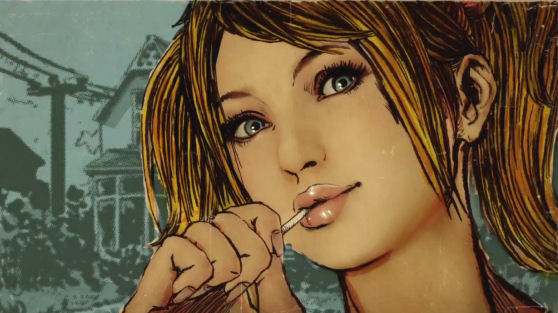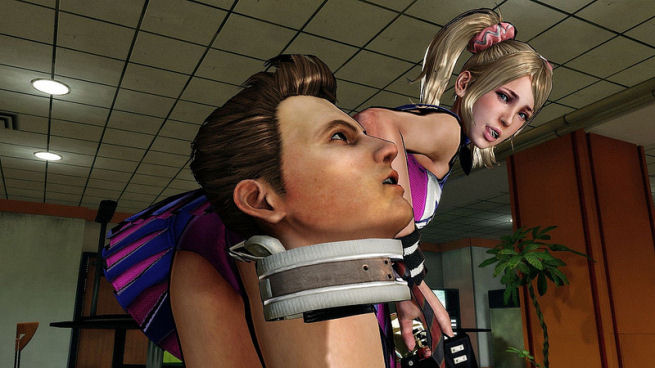“Well, I think Juliet is wide-eyed and innocent, but it isn’t in the typical way people try to portray innocence in characters,” Gunn says. “Usually, they mean ‘lack of sexual experience’ when they mean innocence. Although I don’t think Juliet has a lot of sexual experience, she has some, so she’s not innocent in that way. But I do think that she has this innocent, optimistic way of looking at the world — turning bad situations into something positive, and turning cataclysmically awful situations into slight bothers. She sees the good in almost anything and means no harm towards anyone. But cutting off the heads of zombies is second nature to her, and she loves it. It’s an unusual mix.”
Can, as Gunn phrases it, “blood and rainbows and little pink hearts” describe a girl whose one true love is massacring the undead, and can those ostensibly superficial qualities be genuine, as Gunn is suggesting? Buffy fought evil in “stylish yet affordable boots” (Season 6’s “Once More, with Feeling”) and would complain when she broke a nail or found a split end, but she’s still one of the most praised female characters in fiction.
Even Juliet’s relationship with Nick sounds comparable to Buffy’s romantic experience with former boyfriend Riley Finn, giving her a sense of depth. “He’s used to feeling like the one with the control in a relationship — and in one day he loses his body while simultaneously learning his girlfriend is capable of superhuman feats,” Gunn says. “This brings on a lot of feelings of worthlessness. The fact that Juliet sees the silver lining in everything becomes pretty irritating to Nick almost immediately.”
Many recognize Whedon’s character as a leading figure of feminist empowerment, but when it comes to Lollipop Chainsaw, people have commented on the derogatory and arguably misogynistic nature of the game. These allegations are steep, but they don’t worry Gunn.
“I think a lot of people have a difficult time distinguishing between lust and misogyny,” he says. “It would be dishonest to say that Lollipop Chainsaw doesn’t exploit — and I’m not using this term in a negative way — Juliet’s physical beauty. But I don’t think this is antiwoman any more than how Spartacus featuring male bodies is antimen. And I’m not even really on board with saying it’s not misogynistic because Juliet is a ‘strong character’ or ‘a symbol of female empowerment.’ I generally think that’s a simplistic way of looking at things.
“When a female character becomes only a symbol of female empowerment, you are nullifying who she is as a person, and that’s as misogynistic, or misanthropic, as the thing it’s supposedly reacting to. When I write — whether it’s a game or a movie — I feel the female characters as strongly as I do the male characters. I feel 100 percent female while writing them. I also feel 100 hundred percent female when listening to an Adele song, but that’s a different story. I think my female characters — whether it’s Starla in Slither, Ana in Dawn of the Dead, Libby in Super, or Juliet in Lollipop Chainsaw — are all fully rounded characters. I don’t fall back on the traditional, easy ideas of women solely as victims or solely as symbols of female empowerment. They’re weak in some ways, strong in some ways, smart in some ways, and stupid in others — but they’re full people, even in the case of Lollipop, which is largely a silly, spoofy, campy, rock ’n’ roll, in-your-face romp.
“What is misogynistic — or, at least, sexist — to me,” Gunn says, “are 90 percent of films and games out there that have a bunch of well-written male characters with exciting characteristics, and then a female character whose only personality trait would be ‘being pretty’ or ‘good.’ Think of 95 percent of every mainstream comedy ever. Boring! I wrote Juliet. I really truly love her as a character in the same exact way I love Nick and Gideon and the male characters in the game. So I don’t know where this supposed misogyny is rooted.”
Perhaps the explicit marketing surrounding Juliet Starling has diminished the power and potential of her character, making a bad impression. Maybe she’s just as admirable as Buffy is, only “far more flawed, sexual, and just overtly more comedic,” as Gunn thinks.
If Juliet is as eager to defend the world from zombies and find the good in the people around her as Buffy is, who are we to tell her to wear a longer skirt?
VentureBeat's mission is to be a digital town square for technical decision-makers to gain knowledge about transformative enterprise technology and transact. Learn More


